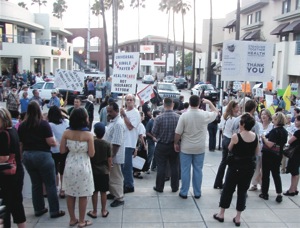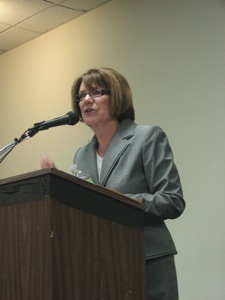san diego
Congressmember’s visit emphasizes pros of national health care reform
Significant changes proposed
Published Thursday, 20-Aug-2009 in issue 1130
Hundreds of people, mostly pro-reform, turned out to voice their opinions about national health care reform and to listen to Congressmember Susan Davis speak about the House’s health care reform bill at a Hillcrest Town Council meeting at the Joyce Beers Community Center on Tuesday, Aug. 11.
“Yes we can! Yes we can! Yes we can!” chanted around 50-100 pro-reformers standing in a mostly pro-reform line of people that began from the front entrance of the community center to the back end of the Uptown District Shopping Center condos, near the Vermont Street Pedestrian Bridge.
An hour before Davis arrived, Vermont Street and Vermont Way, the intersection in front of the community center, became lines of demarcation between those for and against national health care reform. The pro-reformers stood in stark contrast to the 20 to 30 anti-reformers who stood across the street, beside Trader Joe’s. Both sides held signs and sang chants that expressed their positions on health care reform but the pro-reform group’s chants drowned out those of the anti-reform group. Once the center doors opened, it filled its capacity of 320 within minutes, with another 200 people waiting outside. Inside, Davis spoke about the House bill, America’s Affordable Health Choices Act of 2009.
“HR 3200 (the health care reform bill) has been introduced into the House of Representatives. As a member of Congress, we have held dozens of hearings,” said Davis. “Three committees are working with this legislation, and they’ve all held a number of hearings, and we have all been poring over the text.”
The bill would make a number of changes to current health care insurance policy in the US. First, health care insurance companies would no longer be able to deny a person an insurance policy for having a preexisting condition.
“If you or your child have an illness in your medical history, known as a preexisting condition, nothing could stop you from applying for health coverage,” Davis said.
The development of a serious medical condition could no longer be legitimate reason for health care insurers to drop a policyholder.
“Health insurers would no longer be able to set lifetime limits on how much you can spend on medical services before you lose your coverage,” Davis said.
The bill also proposes what is being called a Health Insurance Exchange, which would allow consumers to compare existing health care insurance policies.
“The goal of the health insurance exchange is to make it easy to compare premium costs, benefits and co-payments,” Davis said. “The mission is a kind of Expedia-like tool for health coverage.”
One choice of the Health Insurance Exchange (HIE) would be a public option. Davis did not discuss what the public option would entail but did mention its benefits.
A public option would bring competition, and competition would reduce prices of premiums and policies, Davis said, adding that health insurance premiums doubled for a family of four over the last decade.
As the room became a pressure cooker – organizers kept the doors shut to prevent any more people from entering – Davis opened the meeting up for a short question and answer session.
Debra Fiegura, a Hillcrest resident with several disabilities who relies on Medi-Cal and Medicare, wanted to know how the new legislation would affect people like her who can’t afford health insurance.
“There will be the same kinds of options out there today. Depending upon your income, there may be some subsidies for you to make the choice that you do in a marketplace. The public option can be there for you as well,” Davis said.
Mark Stevens of Hillcrest asked Davis about the cost of reforming our health care system. “How can we get an affordable system, a cheaper system when the cost is $1.4 trillion, according to the Office of Management and Budget?”
“I think there has actually been some, one of the CEOs from one of the offices came back and said that it actually was not that high. They went back and looked at some of the issues, and I think they came in with a figure that was closer to about $68 billion. Still it’s a huge figure,” Davis said.
In what seemed to be a further answer to Stevens’ question, Joy de la Ren of Clairemont Mesa said, “Insurance companies take 35 percent for administrative costs and profit. Medicare takes three percent. We’ve already got 32 percent that we’re saving. Furthermore, everyone can go into the E.R., OK? We as taxpayers are paying for that. Estimate that as 25 percent. Add it up. That’s how much we’re saving to start with. That’s where our money is going to come from.”
Davis responded: “One of the things in this bill is that in order for insurance companies to be a part of the Insurance Exchange, they have to have what’s called a Cost/Loss Ratio of no more than 85 percent, which essentially means that they can only spend 15 percent on administration. So that’s a change and a shift.”
Federico Moramarco, Bankers Hill resident, said he does not believe the bill goes far enough in its reforms.
“I’m concerned with this bill, in that it leaves the insurance companies in between the doctors and the patient for the most part,” Moramarco said. “And I wonder if there is any hope of pushing further and getting the insurance business out of health [care] all together?”
“People do want change, but I think it’s change that people have a comfort level with. I do believe that it’s important for us to [go] where we have a system that a lot of people would like, to build on that as best we can,” Davis said. “And I think that by setting standards that say, ‘You can’t just drop people. No preexisting conditions. You can’t just keep raising premiums. You have to keep them in 2013 the way they are today.’ That will help.”
After the meeting, people left the building and reestablished their positions at the shopping center intersection, this time with pro-reform people intermingled with anti-reform people at the side end of Trader Joe’s. As cars drove by, both sides shared their opinion of the other, continuing to chant and wave signs for another half hour.
|
|
Copyright © 2003-2025 Uptown Publications



